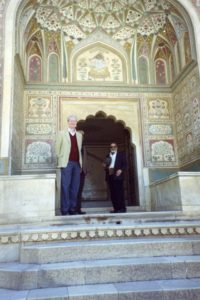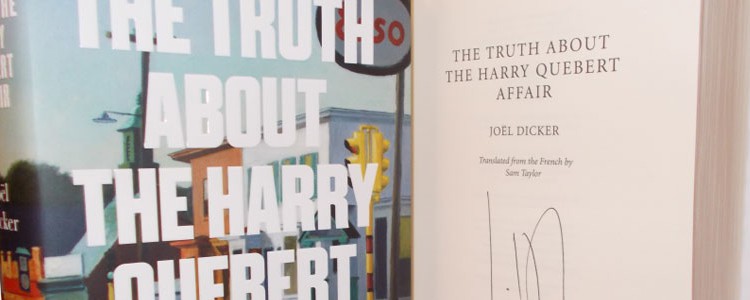Jaya’s newsletter 3 – 11 November 2016
( Please feel free to write with suggestions and comments: jayabhattacharjirose1 at gmail dot com )
Hello!
On 8 September 2016, the demonetization of Rs 500 and Rs 1000 was announced by the government of India. Newly designed currency, freshly minted with embedded chips will be brought into circulation. It is a move to counter black money in the country but it would be interesting to know how this impacts many of the publishers and booksellers in India, many of whom deal predominantly in cash. For now it is impossible to tell.
New Arrivals
- Jorge Carrion Bookshops (MacLehose Press)
- Cecilia Ahern Lyrebird ( HarperCollins India)
- Jeff Kinney Diary of a Wimpy Kid: Double Down ( Puffin, PRH India)
- Twinkle Khanna The Legend of Lakshmi Prasad ( Juggernaut)
- Bina Shah A Season for Martyrs ( Speaking Tiger)
- Ritu Menon Loitering with Intent ( Speaking Tiger)
- T.J.S. George Askew ( Aleph)
- Anthony Horowitz Magpie Murders ( Hachette)
- Jeffrey Archer This was a Man ( Pan MacMillan India )
Jaya Recommends:
- Rajelakshmy, a physicist by training who published these extraordinary “feminist” stories in the weekly
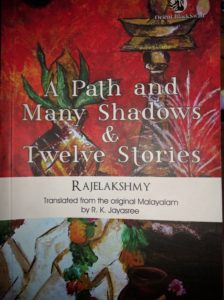 Mathrubhumi and monthly Mangalodayam. She committed suicide in 1965 but the stories and the incomplete novel have been compiled together for the first time as A Path and Many Shadows& Twelve Stories (Translated from Malayalam by R.K. Jayasree, Orient Black Swan)
Mathrubhumi and monthly Mangalodayam. She committed suicide in 1965 but the stories and the incomplete novel have been compiled together for the first time as A Path and Many Shadows& Twelve Stories (Translated from Malayalam by R.K. Jayasree, Orient Black Swan) 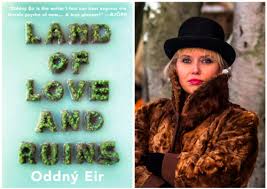 Oddny Eir’s incredibly stunning Land of Love and Ruins. It is a semi-autobiographical reflection on nature, literature, philosophy and commerce. Oddny Eir has also written songs for Bjork. (Translated from the Icelandic by Philip Roughton, Restless Books)
Oddny Eir’s incredibly stunning Land of Love and Ruins. It is a semi-autobiographical reflection on nature, literature, philosophy and commerce. Oddny Eir has also written songs for Bjork. (Translated from the Icelandic by Philip Roughton, Restless Books)- Seirai Yuichi’s magnificent Ground Zero, Nagasaki : Short Stories . These
 chilling stories set in contemporary Nagasaki are about the minority community of Japanese practising Catholicism and trying to survive the endless trauma of the atomic bomb. (Translated by Paul Warham. Columbia University Press)
chilling stories set in contemporary Nagasaki are about the minority community of Japanese practising Catholicism and trying to survive the endless trauma of the atomic bomb. (Translated by Paul Warham. Columbia University Press) - Raina Telgemeier’s absorbingly brilliant graphic novel Ghosts. It is about
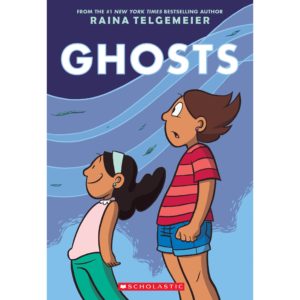 little Catrina who has cystic fibrosis and celebration of Dia de los Muertos or the Day of the Dead. It is to be released at the Comic Con, Bangalore. (Scholastic India)
little Catrina who has cystic fibrosis and celebration of Dia de los Muertos or the Day of the Dead. It is to be released at the Comic Con, Bangalore. (Scholastic India)
Book Events
11 Nov: Sahitya Akademi symposium on Rajelakshmy at 5:30pm
11-13 Nov: Kathakar, Children’s Literature Festival, IGNCA New Delhi followed by 14 November at the IGNCA Bengaluru and on 17 November at the CSMVS, Mumbai
12-13 Nov: Comic Con, Bangalore
14 Nov: Simon & Schuster India will be celebrating 5 years in India (By invitation only)
15 Nov: Shauna Singh Baldwin will be in conversation with Amrita Bhalla to discuss the diasporic writings about 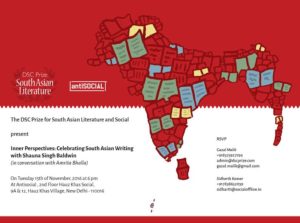 South Asian life and culture and will also talk about and read from her latest book “Reluctant Rebellions”.
South Asian life and culture and will also talk about and read from her latest book “Reluctant Rebellions”.
People & Jobs
Rahul Dixit has been appointed Sales Director, HarperCollins India. He was earlier with PRH India.
A few days ago legendary literary agent, Gillon Aitken, passed away. Patrick French posted a short tribute on his Facebook page along with some marvellous photographs. Republished with permission.
A one-year vacancy of the books editor at The Caravan Magazine has been announced.
Prizes
- The Order of the Rising Sun – Gold & Silver Ray, the highest civilian award by Imperial

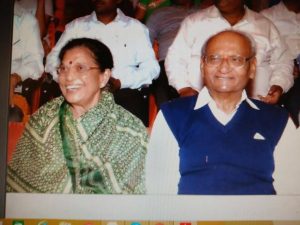 Majesty of Japan, was conferred on Manorama Jaffa in recognition of her contribution to children’s writing in India. After Prof. Brij Tankha, Mrs. Jaffa is the second Indian to have been honoured.
Majesty of Japan, was conferred on Manorama Jaffa in recognition of her contribution to children’s writing in India. After Prof. Brij Tankha, Mrs. Jaffa is the second Indian to have been honoured. - SPARROW Literary Award 2016: The SPARROW panel of judges (N Sukumaran, Kannan Sundaram and Ambai) for SPARROW-R Thyagarajan Literary Award decided to choose the category of translation for award this year. Translations from one Indian language to another and direct translation from a foreign language (other than English) to Tamil were taken for consideration. The SPARROW-R Thyagarajan Literary Award 2016 will go to Kulachal S M Yoosuf for his translations from Malayalam to Tamil, Gowri Kirubanandan, for her translations from Telugu to Tamil and Sridharan Madhusudhanan for his translations from Chinese to Tamil.
- French-Moroccan writer Leïla Slimani won the Goncourt, France’s top literary prize. The former journalist is only the seventh woman to have won the Goncourt in its 112-year history. The novel has been a best seller — more than 76,000 copies have been purchased so far.
- Madeleine Thien’s Do Not Say We Have Nothing won the Giller Prize ( $100,000)
- Lynne Kutsukake’s The Translation of Loves won the 2016 Canada-Japan Literary Award (English category). And Genevieve Blouin’s Hanaken: Le Sang des Samourais won in the French category.
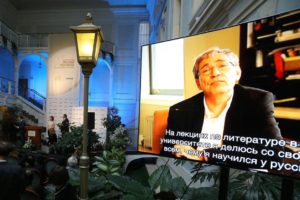 Orhan Pamuk won the 1million rouble (US$15,715) Russian Yasnaya Polyana Literary Prize, based at Leo Tolstoy’s estate. Pamuk’s novel A Strangeness in My Mind translated into Russian in 2016, won in the “Foreign literature” nomination of the award, which aims to support both the traditions of classical literature and new trends in contemporary writing. ( http://bit.ly/2fnbDxT ) The Russian translator of Pamuk’s novel, Apollinaria Avrutina, receives a prize of 200,000 rubles (US$3,143). The Yasnaya Polyana Literary Prize was founded in 2003 by Samsung Electronics and the museum and estate of Leo Tolstoy in Tula. According to the jury chairman Vladimir Tolstoy, Leo Tolstoy’s great grandson and cultural advisor to the Russian president, the award is meant to help readers find their way in the world of Russia’s literature and international contemporary books—a universal reply to the question “What to read?”
Orhan Pamuk won the 1million rouble (US$15,715) Russian Yasnaya Polyana Literary Prize, based at Leo Tolstoy’s estate. Pamuk’s novel A Strangeness in My Mind translated into Russian in 2016, won in the “Foreign literature” nomination of the award, which aims to support both the traditions of classical literature and new trends in contemporary writing. ( http://bit.ly/2fnbDxT ) The Russian translator of Pamuk’s novel, Apollinaria Avrutina, receives a prize of 200,000 rubles (US$3,143). The Yasnaya Polyana Literary Prize was founded in 2003 by Samsung Electronics and the museum and estate of Leo Tolstoy in Tula. According to the jury chairman Vladimir Tolstoy, Leo Tolstoy’s great grandson and cultural advisor to the Russian president, the award is meant to help readers find their way in the world of Russia’s literature and international contemporary books—a universal reply to the question “What to read?”
Meanwhile PEN America has released a revised version of its modified contract for literary translations . It is worth looking at.
Miscellaneous
 Bookshops: In Lucknow the iconic Ram Advani’s bookshop closed down on Sunday, 6 November 2016 as there was no one left to run it after his death. But there was good news with the resurrection of Walking Bookfairs, Bhubaneswar, Odisha. After the book shack was demolished the founders Satabdi Mishra and Bahibala Akshaya built a new bookstore saying “Bookstores around the world are closing down. And we are opening a new one. Because we are madly in love with books and bookstores. Long live bookstores!”
Bookshops: In Lucknow the iconic Ram Advani’s bookshop closed down on Sunday, 6 November 2016 as there was no one left to run it after his death. But there was good news with the resurrection of Walking Bookfairs, Bhubaneswar, Odisha. After the book shack was demolished the founders Satabdi Mishra and Bahibala Akshaya built a new bookstore saying “Bookstores around the world are closing down. And we are opening a new one. Because we are madly in love with books and bookstores. Long live bookstores!”
 London-based publisher, Reem Makhoul, of Ossass gave a tremendous interview to Marcia Lynx Qualey, ArabLit on children’s literature where Reem says they wanted to give the children what they are familiar with, so began creating beautiful books in colloquial Arabic. Amazon too seeing the potential of a reading habit has launched an app for children – Amazon Rapids Recently the Financial Times listed a series of smartphone reading apps or a mobile library such as The Pigeonhole, Alexi and Oolipo.
London-based publisher, Reem Makhoul, of Ossass gave a tremendous interview to Marcia Lynx Qualey, ArabLit on children’s literature where Reem says they wanted to give the children what they are familiar with, so began creating beautiful books in colloquial Arabic. Amazon too seeing the potential of a reading habit has launched an app for children – Amazon Rapids Recently the Financial Times listed a series of smartphone reading apps or a mobile library such as The Pigeonhole, Alexi and Oolipo.
11 Nov 2016

